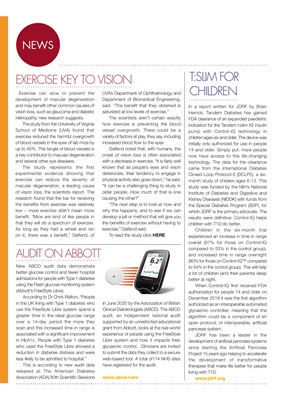
NEWS
EXERCISE KEY TO VISION
Exercise can slow or prevent the
development of macular degeneration
and may benefit other common causes of
vision loss, such as glaucoma and diabetic
retinopathy, new research suggests.
The study from the University of Virginia
School of Medicine (UVA) found that
exercise reduced the harmful overgrowth
of blood vessels in the eyes of lab mice by
up to 45%. This tangle of blood vessels is
a key contributor to macular degeneration
and several other eye diseases.
The study represents the first
experimental evidence showing that
exercise can reduce the severity of
macular degeneration, a leading cause
of vision loss, the scientists report. The
research found that the bar for receiving
the benefits from exercise was relatively
low - more exercise didn't mean more
benefit. "Mice are kind of like people in
that they will do a spectrum of exercise.
As long as they had a wheel and ran
on it, there was a benefit," Gelfand, of
In a report written for JDRF by Brian
Herrick, Tandem Diabetes has gained
FDA clearance of an expanded paediatric
indication for the Tandem t:slim X2 insulin
pump with Control-IQ technology in
children ages six and older. The device was
initially only authorized for use in people
14 and older. Simply put: more people
now have access to this life-changing
technology. The data for the clearance
came from the International Diabetes
Closed Loop Protocol-5 (DCLP5), a sixmonth
study of children ages 6-13. This
study was funded by the NIH's National
Institute of Diabetes and Digestive and
Kidney Diseases (NIDDK) with funds from
the Special Diabetes Program (SDP), for
which JDRF is the primary advocate. The
results were definitive: Control-IQ helps
children with T1D do better.
Children in the six-month trial
experienced an increase in time in range
overall (67% for those on Control-IQ
compared to 53% in the control group),
and increased time in range overnight
(80% for those on Control-IQ™ compared
to 54% in the control group). This will help
a lot of children (and their parents) sleep
better at night.
When Control-IQ first received FDA
authorization for people 14 and older on
December 2019 it was the first algorithm
authorized as an interoperable automated
glycaemic controller, meaning that the
algorithm could be a component of an
open protocol, or interoperable, artificial
pancreas system.
JDRF has been a leader in the
development of artificial pancreas systems
since starting the Artificial Pancreas
Project 15 years ago helping to accelerate
the development of transformative
therapies that make life better for people
living with T1D.
www.jdrf.org
T:SLIM FOR
CHILDREN
New ABCD audit data demonstrate
better glucose control and fewer hospital
admissions for people with Type 1 diabetes
using the Flash glucose monitoring system
(Abbott's FreeStyle Libre).
According to Dr Chris Walton, "People
in the UK living with Type 1 diabetes who
use the FreeStyle Libre system spend a
greater time in the ideal glucose range
over a 14-day period the more they
scan and this increased time in range is
associated with a significant improvement
in HbA1c. People with Type 1 diabetes
who used the FreeStyle Libre showed a
reduction in diabetes distress and were
less likely to be admitted to hospital."
This is according to new audit data
released at The American Diabetes
Association (ADA) 80th Scientific Sessions
AUDIT ON ABBOTT UVA's Department of Ophthalmology and
Department of Biomedical Engineering,
said. "The benefit that they obtained is
saturated at low levels of exercise."
The scientists aren't certain exactly
how exercise is preventing the blood
vessel overgrowth. There could be a
variety of factors at play, they say, including
increased blood flow to the eyes
Gelfand noted that, with humans, the
onset of vision loss is often associated
with a decrease in exercise. "It is fairly well
known that as people's eyes and vision
deteriorate, their tendency to engage in
physical activity also goes down," he said.
"It can be a challenging thing to study in
older people. How much of that is one
causing the other?"
"The next step is to look at how and
why this happens, and to see if we can
develop a pill or method that will give you
the benefits of exercise without having to
exercise," Gelfand said.
To read the study click HERE.
in June 2020 by the Association of British
Clinical Diabetologists (ABCD). The ABCD
audit, an independent national audit
supported by an unrestricted educational
grant from Abbott, looks at the real-world
experience of people using the FreeStyle
Libre system and how it impacts their
glycaemic control. Clinicians are invited
to submit the data they collect to a secure
web-based tool. A total of114 NHS sites
have registered for the audit.
www.abcd.care